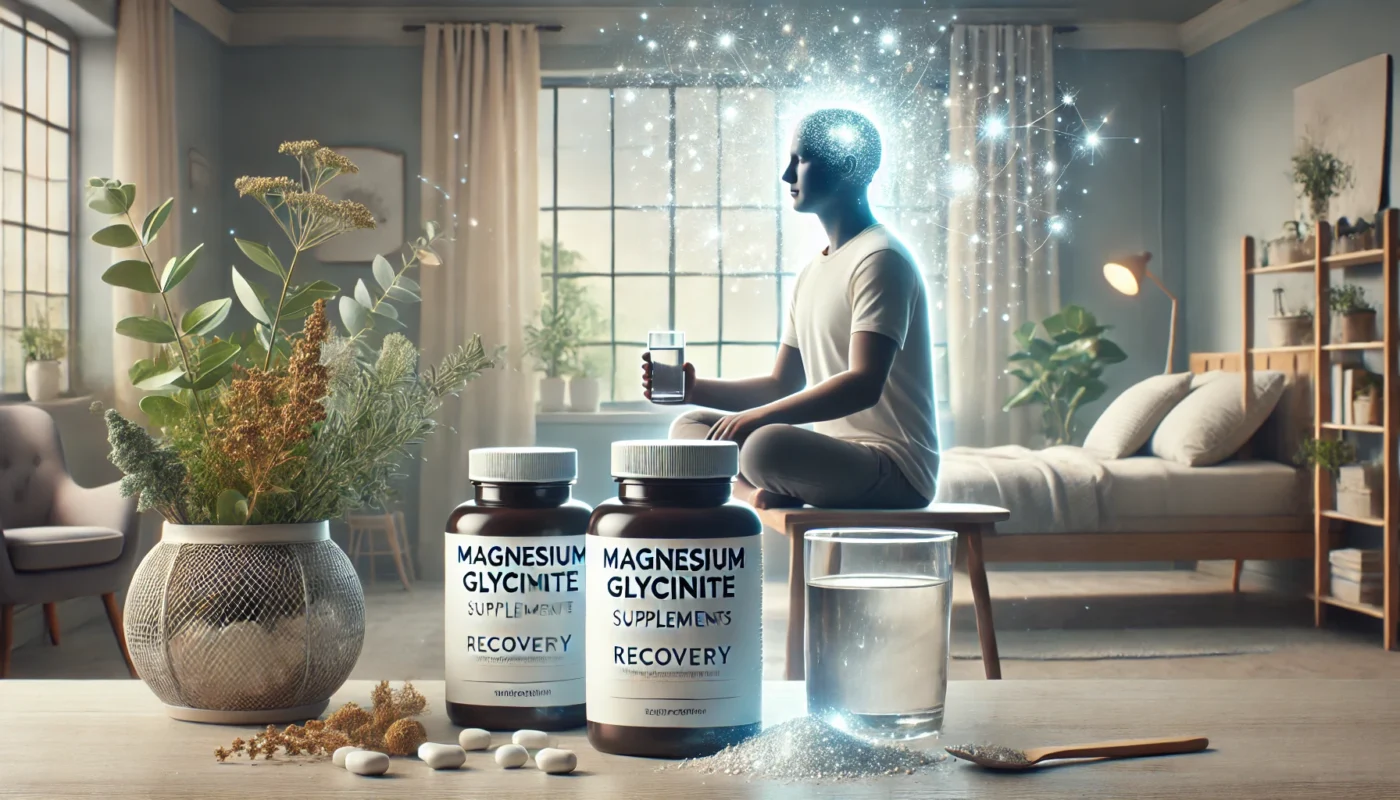Caffeine is a widely consumed stimulant, with approximately 85% of Americans consuming at least one caffeinated beverage daily (Mitchell et al., 2014). While moderate caffeine intake offers benefits such as enhanced alertness and improved mood, excessive consumption or chronic use can strain the adrenal glands and lead to dependency. Withdrawal symptoms, including fatigue, headaches, and irritability, often deter individuals from reducing their caffeine intake. This is where magnesium glycinate, a highly bioavailable form of magnesium, can play a critical role in recovery.
This article explores how magnesium glycinate supports the body during caffeine withdrawal by balancing adrenal health, reducing withdrawal symptoms, and promoting overall recovery.
You May Also Like:
The Science of Magnesium Glycinate and its Impact on Brain Function
How Magnesium Glycinate Addresses Morning Brain Fog: Here’s the Science
Understanding Caffeine’s Impact on Adrenal Health
Caffeine stimulates the central nervous system by blocking adenosine receptors, which delays the onset of fatigue and boosts energy. However, chronic caffeine use activates the hypothalamic-pituitary-adrenal (HPA) axis, leading to increased cortisol production. Elevated cortisol levels over time can tax the adrenal glands, resulting in symptoms of adrenal fatigue, such as:
- Persistent tiredness
- Difficulty handling stress
- Sleep disturbances
Adrenal fatigue, while controversial in some medical circles, is often associated with chronic overstimulation of the HPA axis (Wilson, 2014). Prolonged caffeine use exacerbates magnesium depletion, as the body uses magnesium to metabolize caffeine and manage stress-induced cortisol release.

Magnesium’s Role in Recovery from Caffeine Overuse
Magnesium is essential for over 300 enzymatic reactions in the body, including energy production, nervous system regulation, and stress response. Magnesium glycinate, a combination of magnesium and glycine, offers superior bioavailability and a calming effect, making it particularly effective for individuals recovering from caffeine overuse. Its benefits include:
- Restoring Magnesium Levels Chronic caffeine consumption increases urinary magnesium excretion, leading to deficiencies. Studies indicate that 48% of the U.S. population does not meet the recommended magnesium intake (Rosanoff et al., 2012). Magnesium glycinate replenishes magnesium levels, supporting adrenal recovery and energy production.
- Reducing Withdrawal Symptoms Caffeine withdrawal symptoms, such as headaches and muscle tension, can be mitigated by magnesium. Magnesium’s ability to relax blood vessels and reduce neuromuscular excitability makes it effective in alleviating these symptoms (Mauskop & Varughese, 2012).
- Balancing Cortisol Levels Magnesium plays a pivotal role in regulating the stress response. Research published in Nutrients shows that magnesium supplementation reduces cortisol levels and improves resilience to stress (Tarleton et al., 2017). This is crucial for individuals recovering from adrenal strain caused by caffeine overuse.
- Improving Sleep Quality Poor sleep is a common side effect of caffeine dependency. Magnesium glycinate’s calming properties, attributed to its glycine component, promote better sleep quality by enhancing neurotransmitters like GABA, which support relaxation and reduce anxiety (Abbasi et al., 2012).
- Supporting Neurotransmitter Function Chronic caffeine use disrupts neurotransmitter balance, particularly dopamine and serotonin. Magnesium is vital for the synthesis of these neurotransmitters, aiding mood stabilization and reducing irritability during withdrawal (Murck, 2002).
Clinical Evidence Supporting Magnesium Glycinate
Numerous studies highlight magnesium’s role in stress regulation, adrenal health, and withdrawal symptom management:
- Stress and Cortisol Regulation A study in the Journal of the American College of Nutrition found that magnesium supplementation reduced perceived stress scores by 30% in participants under chronic stress (Singewald et al., 2004).
- Headache Relief Research published in Headache: The Journal of Head and Face Pain demonstrated that magnesium reduced headache frequency by 41.6% in individuals with migraines, suggesting its potential to alleviate caffeine withdrawal headaches (Peikert et al., 1996).
- Sleep Improvement In a randomized controlled trial, older adults with insomnia experienced significant improvements in sleep efficiency and time after taking magnesium supplements, supporting its efficacy in restoring restful sleep (Abbasi et al., 2012).
- Neurotransmitter Modulation A study in Neuropsychobiology highlighted magnesium’s role in enhancing serotonin receptor function, which contributes to its mood-stabilizing effects (Murck, 2002).

Practical Tips for Using Magnesium Glycinate During Recovery
- Start with an Appropriate Dosage The Recommended Dietary Allowance (RDA) for magnesium is 310–420 mg/day for adults, depending on age and sex. For therapeutic purposes, doses of 200–400 mg/day of magnesium glycinate are typically recommended. Consult a healthcare provider to determine the optimal dosage.
- Combine with Balanced Nutrition Pair magnesium supplementation with a diet rich in magnesium-containing foods such as spinach, almonds, and avocados. Avoiding processed foods and sugary snacks can further support adrenal recovery.
- Gradually Reduce Caffeine Intake Abrupt caffeine cessation can exacerbate withdrawal symptoms. A gradual tapering process, combined with magnesium glycinate, can ease the transition and minimize discomfort.
- Stay Hydrated Dehydration worsens withdrawal symptoms such as fatigue and headaches. Aim to drink at least 8–10 glasses of water daily to support recovery.
- Incorporate Stress Management Practices Mindfulness meditation, yoga, and deep breathing exercises can enhance magnesium’s calming effects and help manage withdrawal-induced anxiety.
Magnesium Glycinate vs. Other Magnesium Forms
Magnesium supplements come in various forms, including citrate, oxide, and sulfate. Magnesium glycinate offers distinct advantages:
- Superior Absorption: The chelated form is better absorbed in the gastrointestinal tract, reducing the risk of diarrhea associated with other forms like magnesium oxide.
- Gentle on the Stomach: Magnesium glycinate is less likely to cause digestive discomfort.
- Dual Benefits: The glycine component provides additional calming effects, supporting relaxation and sleep.
Addressing Common Concerns
- Is Magnesium Glycinate Safe? Magnesium glycinate is generally well-tolerated when taken within recommended dosages. Side effects are rare but may include mild gastrointestinal upset.
- How Long Does Recovery Take? Recovery timelines vary based on caffeine dependency levels and overall health. Most individuals notice improvements in energy, mood, and sleep within 2–4 weeks of consistent magnesium supplementation.
- Can Magnesium Glycinate Be Taken with Other Supplements? Magnesium glycinate pairs well with vitamin B6, which enhances magnesium’s absorption and further supports adrenal health. However, consult a healthcare provider before combining supplements.

Long-Term Benefits of Magnesium Glycinate
In addition to aiding caffeine recovery, magnesium glycinate offers long-term health benefits:
- Improved Stress Resilience: Regular supplementation supports the body’s ability to handle stress.
- Cardiovascular Health: Magnesium is vital for maintaining healthy blood pressure and reducing cardiovascular risk factors (Zhang et al., 2016).
- Bone Health: Magnesium contributes to bone mineral density, reducing the risk of osteoporosis.
Future Research Directions
While existing studies highlight magnesium’s benefits, future research could explore:
- The synergistic effects of magnesium glycinate with other adaptogenic herbs like ashwagandha in adrenal recovery.
- The impact of long-term magnesium supplementation on chronic caffeine users.
- The efficacy of magnesium glycinate in addressing comorbid conditions, such as anxiety and insomnia, in caffeine withdrawal.
Conclusion: Magnesium Glycinate for Recovery from Caffeine Overuse
Magnesium glycinate offers a science-backed, effective solution for individuals recovering from chronic caffeine use. By replenishing magnesium levels, supporting adrenal health, and alleviating withdrawal symptoms, this supplement helps individuals regain balance and resilience. Incorporating magnesium glycinate into a holistic recovery plan, alongside gradual caffeine reduction and lifestyle adjustments, ensures a smoother transition and sustained well-being.
For those struggling with caffeine dependency and its associated challenges, magnesium glycinate provides a gentle yet powerful tool for recovery. Consult a healthcare provider to tailor supplementation to your specific needs and maximize its benefits.

References
- Magnesium and aging. Retrieved from: https://pubmed.ncbi.nlm.nih.gov/20388094/
- Magnesium in Aging, Health and Diseases. Retrieved from: https://www.mdpi.com/2072-6643/13/2/463
- Enhancement of Learning and Memory by Elevating Brain Magnesium. Retrieved from: https://www.sciencedirect.com/science/article/pii/S0896627309010447
- The Effects of Magnesium Supplementation on Subjective Anxiety and Stress-A Systematic Review. Retrieved from: https://pubmed.ncbi.nlm.nih.gov/28445426/
- Magnesium in the Central Nervous System. Retrieved from: https://www.ncbi.nlm.nih.gov/books/NBK507256/
- Role of magnesium supplementation in the treatment of depression: A randomized clinical trial. Retrieved from: https://www.researchgate.net/publication/317968027_Role_of_magnesium_supplementation_in_the_treatment_of_depression_A_randomized_clinical_trial
- The Cumulative Neurobehavioral and Physiological Effects of Chronic Caffeine Intake: Individual Differences and Implications for the Use of Caffeinated Energy Products. Retrieved from: https://pmc.ncbi.nlm.nih.gov/articles/PMC4404626/
Important Note: The information contained in this article is for general informational purposes only, and should not be construed as health or medical advice, nor is it intended to diagnose, prevent, treat, or cure any disease or health condition. Before embarking on any diet, fitness regimen, or program of nutritional supplementation, it is advisable to consult your healthcare professional in order to determine its safety and probable efficacy in terms of your individual state of health.
Regarding Nutritional Supplements Or Other Non-Prescription Health Products: If any nutritional supplements or other non-prescription health products are mentioned in the foregoing article, any claims or statements made about them have not been evaluated by the U.S. Food and Drug Administration, and such nutritional supplements or other health products are not intended to diagnose, treat, cure, or prevent any disease.

